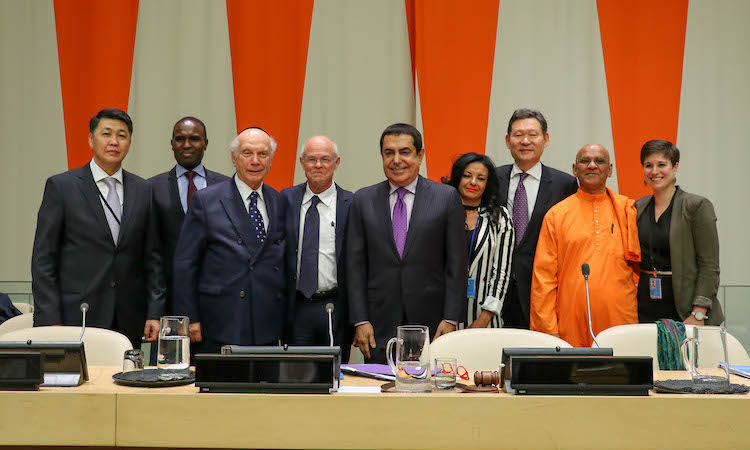By J Nastranis
UNITED NATIONS (IDN) – “The holy scriptures of the Koran, Bible, Torah, the Bhagwad Geeta or the Lotus Sutra” underline “the vital importance to unite the efforts of political and religious leaders for the cause of security and stability across our planet,” said Kazakhstan’s Vice-Minister for Religious Affairs and Civil Society, Berik Aryn, in a keynote address at an event organized by the Kazakh Permanent Mission to the UN in partnership with the United Nations Alliance of Civilizations (UNAOC).
He was speaking on behalf of Kassym-Jomart Tokayev, the Chairman of the Senate of the Parliament of the Republic of Kazakhstan, and Head of the Secretariat of the Congress of the Leaders of World and Traditional Religions, Kazakhstan’s interfaith initiative launched in 2003.
The event – titled Religious Leaders For A Safe World – at the UN Headquarters in New York sought to build on the crucial recommendations of the Congress of the Leaders of World and Traditional Religions organized every three years in Astana, the capital city of the Central Asian republic of Kazakhstan.
The Congress has addressed vital issues such as the growing efforts of religious actors to collaborate with political leaders and civil society, their commitment to foster tolerance and respect for religious and cultural diversity, their responsibility in engaging young people across the world to prevent them from falling into violent extremism.
The Sixth Congress of the Leaders of World and Traditional Religions – under the same theme as the event on April 24, Religious Leaders For A Safe World – will be held on October 10-11, 2018 in Astana. Around 100 delegations from more than 40 countries are expected to attend.
Its partners, among others, are: the UNAOC, the NGO Religions for Peace, King Abdullah bin Abdulaziz International Centre for Interreligious and Intercultural Dialogue (KAICIID) based in Vienna, the World Muslim League, the Pontifical Council for Interreligious Dialogue, Al-Azhar center, the Doha International Center for Interfaith Dialogue, The World Assembly on the approximation of the Islamic schools of thought.
The Congress has become “a hallmark” of contemporary Kazakhstan, and changed the paradigm of state development from the model of conflict and clash of civilizations, cultures and religions, to a model of dialogue and accord based on tolerance, trust and harmony.
The panel of the event at the UN Headquarters included: Rabbi Arthur Schneier, Senior Rabbi, Park East Synagogue, Founder and President, Appeal of Conscience Foundation; Swami Parameshananda, President, Committee of Religious NGOs at the UN and International Representative, Bharat Sevashram Sangha Inc; Dr. William Vendley, Secretary General, Religions for Peace; Jillian Abballe, Advocacy Officer, Ecumenical, United Nations Office, World Council of Churches; and Dr. Mohamed Elsanousi, Director, Network of Religious and Traditional Peacemakers.
Welcoming these eminent representatives of faith-based organizations at the UN, UNAOC High Representative Nassir Abdulaziz Al-Nasser detailed “the efforts of Kazakhstan to sustain peace” in which he had participated.
He took part, in 2013, with UNESCO, in the launch of the international Decade (2013-2022) of Rapprochement of Culture, in Astana, hosted by Kazakhstan, convinced that intercultural dialogue is a vital tool in bringing people together.
Al-Nasser was also a participant and guest of honour at the Fifth Congress of the Leader of the World and Traditional Religions in Astana in 2015. “This is not to mention the numerous meetings on Religions for Peace, here in NY with UNAOC and the mission of Kazakhstan,” he added.
The Kazakh Vice-Minister for Religious Affairs and Civil Society Aryn explained the backdrop to Kazakhstan’s relentless efforts to foster interfaith dialogue:
– The state policy of Kazakhstan is aimed at restoring spiritual values and shaping new forms of durable and lasting tolerance between representatives of different multicultural groups and faiths.
– Kazakhstan’s society is a unique example of interethnic and interfaith accord.
– Every citizen regardless of his ethnic or religious background is an equal member of one family and civil society.
– The noble values inherent in every religion – Islam, Orthodox, Catholicism, Protestantism, Judaism, Buddhism – and others are widely supported by the state.
Kazakhstan is home to more than 100 ethnic groups and 18 religious confessions, whose interests are represented by over 3,700 religious associations. About 3500 religious buildings are functioning.
“Political culture, ethnic and religious diversity has proven to be a major asset of our state and not a challenge. Kazakhstan has demonstrated solid commitment to the UN fundamental concept – unity in diversity. Over centuries tolerance has been part of the Kazakh people’s culture,” averred Aryn.
The Congress held once in three years has been permanently institutionalized. The Secretariat provides considerable support to the Congress. Its members, who are religious leaders, take an active part in facilitating the preparatory work for the Summits, and draft the agenda, concepts, and final documents of the Congress.
“The value-added” of the Congress is that the forum brings together not only religious leaders, but also distinguished politicians, representatives of international organizations, as well as experts and NGOs. The idea behind this approach is that religious and political leaders listen to each other and act together for the common good of humanity. [IDN-InDepthNews – 30 April 2018]
Photo: Panelists in the April 24 event, including Kazakh Vice-Minister Berik Aryn (extreme left), UNAOC High Representative Al-Nasser (centre), and Ambassador Kairat Umarov, the Kazakh Permanent Representative to the UN (third from right at the back). Credit: Kazakh Permanent Mission to the UN Headquarters in New York.
IDN is flagship agency of the International Press Syndicate.
facebook.com/IDN.GoingDeeper – twitter.com/InDepthNews

